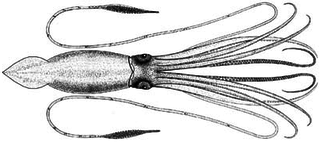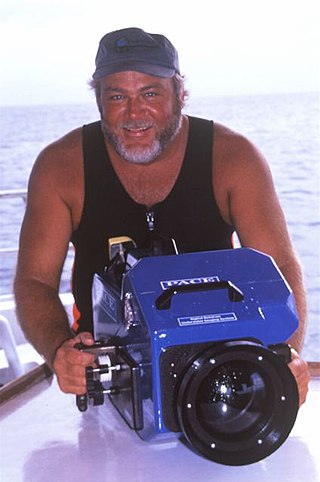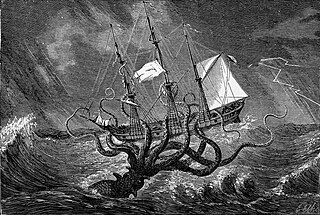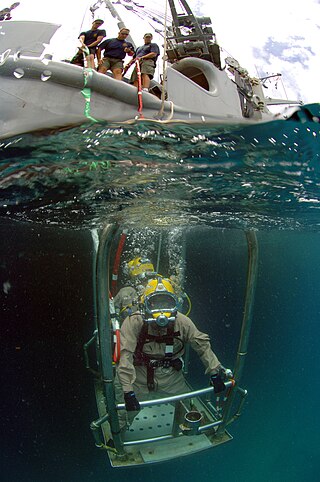Related Research Articles

The giant squid is a species of deep-ocean dwelling squid in the family Architeuthidae. It can grow to a tremendous size, offering an example of abyssal gigantism: recent estimates put the maximum size at around 12–13 m (39–43 ft) for females and 10 m (33 ft) for males, from the posterior fins to the tip of the two long tentacles. This makes it longer than the colossal squid at an estimated 9–10 m (30–33 ft), but substantially lighter, as the tentacles make up most of the length. The mantle of the giant squid is about 2 m long, and the length of the squid excluding its tentacles rarely exceeds 5 m (16 ft). Claims of specimens measuring 20 m (66 ft) or more have not been scientifically documented.

Deep diving is underwater diving to a depth beyond the norm accepted by the associated community. In some cases this is a prescribed limit established by an authority, while in others it is associated with a level of certification or training, and it may vary depending on whether the diving is recreational, technical or commercial. Nitrogen narcosis becomes a hazard below 30 metres (98 ft) and hypoxic breathing gas is required below 60 metres (200 ft) to lessen the risk of oxygen toxicity. At much greater depths, breathing gases become supercritical fluids, making diving with conventional equipment effectively impossible regardless of the physiological effects on the human body. Air, for example, becomes a supercritical fluid below about 400 metres (1,300 ft).

The Blue Planet is a British nature documentary series created and co-produced as a co-production between the BBC Natural History Unit and Discovery Channel. It premiered on 12 September 2001 in the United Kingdom. It is narrated by David Attenborough.

Diving activities are the things people do while diving underwater. People may dive for various reasons, both personal and professional. While a newly qualified recreational diver may dive purely for the experience of diving, most divers have some additional reason for being underwater. Recreational diving is purely for enjoyment and has several specialisations and technical disciplines to provide more scope for varied activities for which specialist training can be offered, such as cave diving, wreck diving, ice diving and deep diving. Several underwater sports are available for exercise and competition.

A diver propulsion vehicle (DPV), also known as an underwater propulsion vehicle, sea scooter, underwater scooter, or swimmer delivery vehicle (SDV) by armed forces, is an item of diving equipment used by scuba divers to increase range underwater. Range is restricted by the amount of breathing gas that can be carried, the rate at which that breathing gas is consumed, and the battery power of the DPV. Time limits imposed on the diver by decompression requirements may also limit safe range in practice. DPVs have recreational, scientific and military applications.
The Catalina Island Marine Institute (CIMI) is a non-profit educational program founded in 1979 and run by Guided Discoveries on Santa Catalina Island, California.
Benjamin Cropp is an Australian documentary filmmaker, conservationist and a former Open Australian spearfishing champion. Formerly a shark hunter, Cropp retired from that trade in 1962 to pursue oceanic documentary filmmaking and conservation efforts. One of his efforts for The Disney Channel, The Young Adventurers, was nominated for an Emmy award.
The International Scuba Diving Hall of Fame (ISDHF) is an annual event that recognizes those who have contributed to the success and growth of recreational scuba diving in dive travel, entertainment, art, equipment design and development, education, exploration and adventure. It was founded in 2000 by the Cayman Islands Ministry of Tourism. Currently, it exists virtually with plans for a physical facility to be built at a future time.

Sodwana Bay is a bay in South Africa on the KwaZulu Natal north coast, between St. Lucia and Lake Sibhayi. It is in the Sodwana Bay National Park, and the Maputaland Marine Reserve, and is a popular recreational diving destination. The term is commonly used to refer to both the marine reserve and the terrestrial park, as well as the geographical bay.
USS YO-257 was a Yard Oiler of the United States Navy that was launched in the early 1940s and scuttled two miles off Waikiki, Honolulu, Hawaii in 1989.
Monty Halls is a British TV broadcaster and marine biologist best known for his BBC Great Escape series Monty Halls' Great Escape, Monty Halls' Great Hebridean Escape and Monty Halls' Great Irish Escape, during which he lived and worked in remote parts of the UK and Ireland with his dog Reuben. Halls' other TV programmes include WWII's Great Escapes, Great Barrier Reef and Lost Worlds with Leo Houlding for Discovery Channel.

Bret Clifton Gilliam was an American pioneering technical diver. He was most famous as co-founder of the certification agency Technical Diving International along with Mitch Skaggs, and as the one time holder of the world record for deep diving on air. He is also one of diving's most popular writers. Gilliam is the author or coauthor of 72 books, over 1500 feature magazine articles, and over 100 magazine cover photos. In his diving career he has logged over 19,000 dives since 1959.

Cephalopod attacks on humans have been reported since ancient times. A significant portion of these attacks are questionable or unverifiable tabloid stories. Cephalopods are members of the class Cephalopoda, which includes all squid, octopuses, cuttlefish, and nautiluses. Some members of the group are capable of causing injury or death to humans.

Jonathan Bird is an American photographer, cinematographer, director and television host. He is best known for his role as the host of Jonathan Bird's Blue World, a family-friendly underwater exploration program on public television in the United States. His work is largely underwater in nature.
Julie Andersen is an activist and a founder of Shark Angels, a nonprofit organization focused on shark conservation.

The following outline is provided as an overview of and topical guide to underwater diving:

The following index is provided as an overview of and topical guide to underwater divers:
Diving support equipment is the equipment used to facilitate a diving operation. It is either not taken into the water during the dive, such as the gas panel and compressor, or is not integral to the actual diving, being there to make the dive easier or safer, such as a surface decompression chamber. Some equipment, like a diving stage, is not easily categorised as diving or support equipment, and may be considered as either.
Cristina Zenato is an Italian-born shark diver and conservationist. She is known for her work with Caribbean reef sharks in The Bahamas.
References
- ↑ "Scott J Cassell, Born 03/16/1962 in California | CaliforniaBirthIndex.org". www.californiabirthindex.org. Retrieved 2022-10-25.
- 1 2 3 "Animal Planet :: Up Close and Dangerous". Discovery Communications. 2012. Retrieved November 26, 2012.
- 1 2 3 4 5 6 7 8 "Scott Cassell - EG Bio". Explore Green. Retrieved November 26, 2012.
- 1 2 Sturtz, Rachel (September 27, 2011). "The REAL Most Interesting Man in the World". Men's Health News . Rodale, Inc. Retrieved November 26, 2012.
- 1 2 Cassell, Scott (December 15, 2005). "Dancing with Demons". deeperblue.net. ISSN 1469-865X . Retrieved November 28, 2012.
- ↑ Cassell, Scott. "In Search of the Red Demon". diver.net. Retrieved November 28, 2012.
- ↑ Cassell, Scott (November 20, 2007). "Monster Quest: The Giant Squid-Found / Scott Cassell's Blog". ScubaBoard.com. Retrieved November 26, 2012.
- 1 2 3 "Luminox Partners with a True Explorer to Save the Planet" (PDF). Luminox. June 2011. Retrieved November 23, 2012.
- ↑ "Feature Stories By Scott Cassell". California Diver Magazine. 2012. Retrieved November 26, 2012.
- ↑ Sohn, Emily (September 14, 2011). "Diver Plans to Attract Sharks in Marathon Swim". Discovery News . Discovery Communications. Retrieved November 25, 2012.
- ↑ "30 MILES UNDER THE SEA - Scott Cassell attempts World Record dive to save endangered sharks". Luminox . Retrieved November 23, 2012.
- ↑ Gunther, Shea (September 17, 2011). "Interview with Scott Cassell: Scuba diver attempting record-setting 30-mile dive". MNN Holdings . Retrieved November 25, 2012.
- ↑ "Scott Cassell completes 30 mile dive from Catalina to San Pedro". California Diver Magazine. September 18, 2011. Retrieved November 26, 2012.
- ↑ Kaknevicius, Ariana (September 23, 2011). "A treacherous dive in the name of conservation". Metro Vancouver . Retrieved November 25, 2012.
- ↑ Sohn, Emily (September 25, 2011). "Long-distance Shark Dive: Success and Failure". Discovery News. Discovery Communications. Retrieved November 25, 2012.